Digital farming enhances agricultural productivity, cost-effectiveness and sustainability. However, the sector lacks skilled people to manage and operate such technologies and help farmers use them. Implemented in the Emilia-Romagna region of Italy, the Digital Farming Specialist project created a programme that trained technicians to fill this gap.
Training in new technologies for more productive, sustainable farming in Italy
- 29 September 2021
'The project trained people to become experts in managing environmental sustainability systems for digital agriculture. This is enabling farmers and agronomists to maintain or improve production while remaining sustainable.'
The three-year programme lasted 800 hours. Of these, 470 were spent on theoretical training with experts from technical colleges, a university and agro-mechanical companies; 300 were spent on internships; and 30 were devoted to project work.
Some 60 participants learnt how to manage sensors, drones, Internet-of-Things devices and integrated GPS, precision-feeding and livestock-motoring systems. The skills taught included processing and analysing data and using image-processing software to support crop management. Trainees learnt to monitor and record environmental and energy-related variables and set targets for improvement.
A need for digital experts
Many farms in Emilia-Romagna already use software to collect, manage and process real-time data. But, experts are needed to interpret this data and use it to increase yields and crop quality. Digital farming specialists thus have excellent job prospects and graduates from the programme already work with farmers.
The benefits are clear: digital techniques enable soil analysis so that farmers can choose the right crops for their soil; they reduce use of water, fertilisers and chemicals; and ensure crops are tended to only when necessary, thereby cutting fuel consumption and CO2 emissions.
As well as supporting moves towards more sustainable agriculture, modern technologies save farmers time and money, which is vital to remain viable in a globalised world where competition is fierce and agricultural production limits are close to being reached.
Supporting regional strategies
The course is aligned with the need for greater integration of production and information processes, and use of sustainable and precision methods. These have been identified as strategic drivers by regional associations of companies and research and training centres in the mechatronics and agro-food sectors.
The project helps achieve the objectives of Emilia-Romagna’s research and innovation strategy: it makes agricultural systems more resilient in the face of climate change, while sustainably increasing their profitability; and it closes the gap between what precision-farming technology offers and what is actually used.
The project is transferable to other regions, since the need to change farming is present everywhere.
Beneficiaries
‘This course has already helped me to make digital choices, such as using a weather station and other sensors. These solutions have allowed me to produce more and better, with less consumption of soil, water and chemicals. We’ve also saved money.’
- Davide Ghizzoni, Reggio Emilia farmer
“During the course, I learnt how to collect, analyse and interpret data for better forecasting and decision-making, and to make efficient use of resources to reduce production costs and environmental impacts, while increasing roduction.”
- Richard Guimezap Cyriaque, training participant
Total investment and EU funding
Total investment for the project “Digital Farming Specialist” is EUR 122 950 with the EU’s European Social Fund contributing EUR 122 950 through the “POR Emilia Romagna ESF” Operational Programme for the 2014-2020 programming period.

